The AMD Ryzen Threadripper 1950X and 1920X Review: CPUs on Steroids
by Ian Cutress on August 10, 2017 9:00 AM ESTCPU Encoding Tests
One of the interesting elements on modern processors is encoding performance. This includes encryption/decryption, as well as video transcoding from one video format to another. In the encrypt/decrypt scenario, this remains pertinent to on-the-fly encryption of sensitive data - a process by which more modern devices are leaning to for software security. Video transcoding as a tool to adjust the quality, file size and resolution of a video file has boomed in recent years, such as providing the optimum video for devices before consumption, or for game streamers who are wanting to upload the output from their video camera in real-time. As we move into live 3D video, this task will only get more strenuous, and it turns out that the performance of certain algorithms is a function of the input/output of the content.
All of our benchmark results can also be found in our benchmark engine, Bench.
7-Zip 9.2: link
One of the freeware compression tools that offers good scaling performance between processors is 7-Zip. It runs under an open-source licence, is fast, and easy to use tool for power users. We run the benchmark mode via the command line for four loops and take the output score.
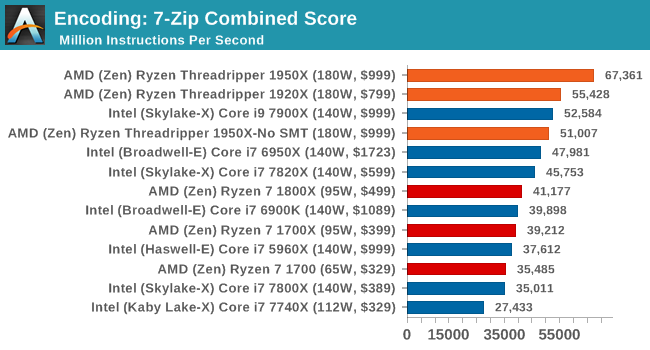
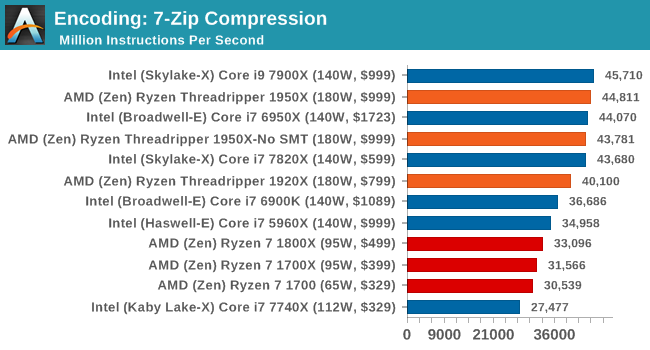
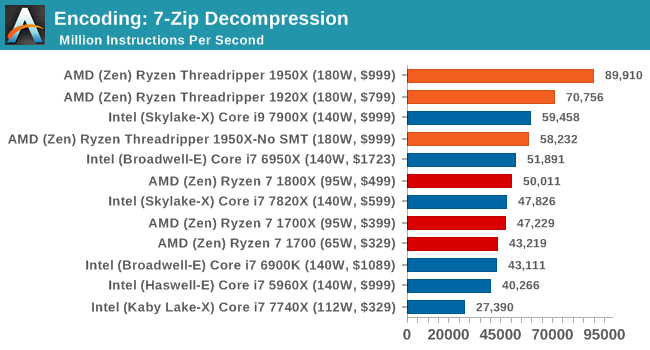
At the request of a few users, we've gone back through our saved benchmark data and pulled out compression/decompression numbers for 7-zip. AMD clearly makes a win here in decompression by a long way.
WinRAR 5.40: link
For the 2017 test suite, we move to the latest version of WinRAR in our compression test. WinRAR in some quarters is more user friendly that 7-Zip, hence its inclusion. Rather than use a benchmark mode as we did with 7-Zip, here we take a set of files representative of a generic stack (33 video files in 1.37 GB, 2834 smaller website files in 370 folders in 150 MB) of compressible and incompressible formats. The results shown are the time taken to encode the file. Due to DRAM caching, we run the test 10 times and take the average of the last five runs when the benchmark is in a steady state.
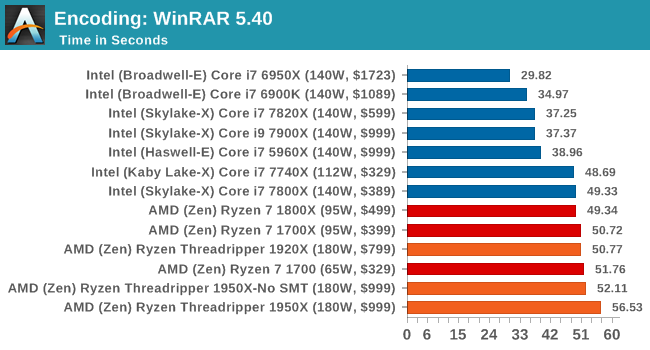
WinRAR encoding is another test that doesn't scale up especially well with thread counts. After only a few threads, most of its MT performance gains have been achieved. Which isn't a help to Threadripper, and is outright a hiderence in Creator Mode.
AES Encoding
Algorithms using AES coding have spread far and wide as a ubiquitous tool for encryption. Again, this is another CPU limited test, and modern CPUs have special AES pathways to accelerate their performance. We often see scaling in both frequency and cores with this benchmark. We use the latest version of TrueCrypt and run its benchmark mode over 1GB of in-DRAM data. Results shown are the GB/s average of encryption and decryption.
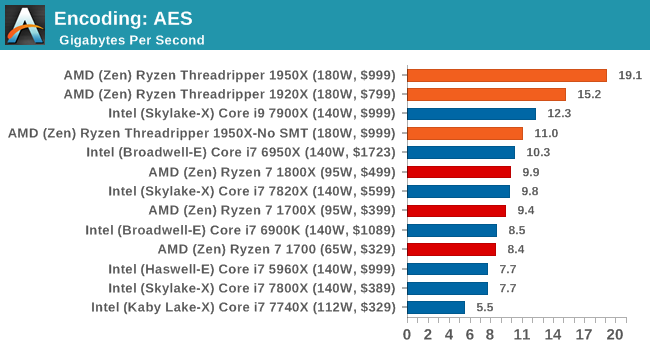
HandBrake v1.0.2 H264 and HEVC: link
As mentioned above, video transcoding (both encode and decode) is a hot topic in performance metrics as more and more content is being created. First consideration is the standard in which the video is encoded, which can be lossless or lossy, trade performance for file-size, trade quality for file-size, or all of the above can increase encoding rates to help accelerate decoding rates. Alongside Google's favorite codec, VP9, there are two others that are taking hold: H264, the older codec, is practically everywhere and is designed to be optimized for 1080p video, and HEVC (or H265) that is aimed to provide the same quality as H264 but at a lower file-size (or better quality for the same size). HEVC is important as 4K is streamed over the air, meaning less bits need to be transferred for the same quality content.
Handbrake is a favored tool for transcoding, and so our test regime takes care of three areas.
Low Quality/Resolution H264: Here we transcode a 640x266 H264 rip of a 2 hour film, and change the encoding from Main profile to High profile, using the very-fast preset.
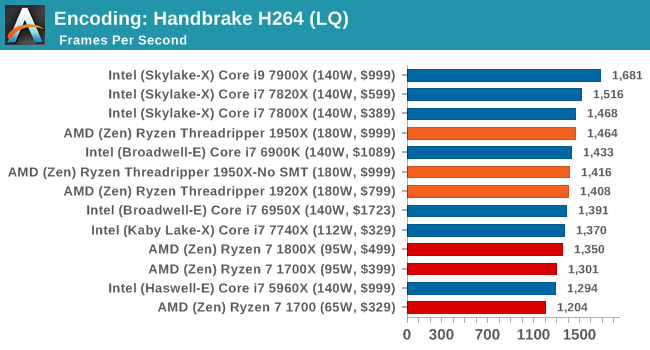
High Quality/Resolution H264: A similar test, but this time we take a ten-minute double 4K (3840x4320) file running at 60 Hz and transcode from Main to High, using the very-fast preset.
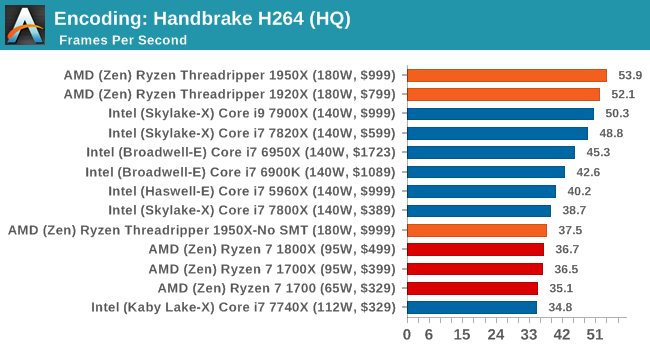
HEVC Test: Using the same video in HQ, we change the resolution and codec of the original video from 4K60 in H264 into 4K60 HEVC.
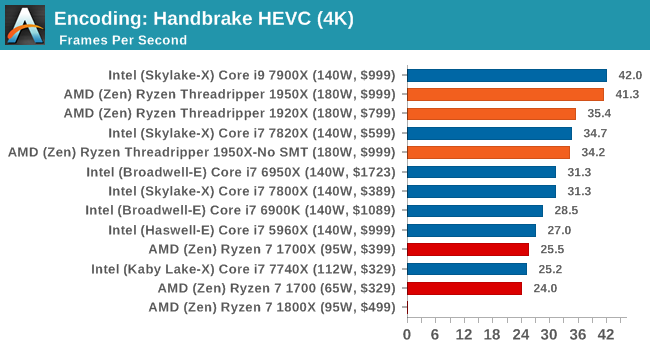
In the HQ H264 test, AMD pushes ahead with both the processors, while SMT-off severely limits the 1950X due to the lack of SMT threads. As we move to HEVC though, the 1950X and 7900X clash on performance.










347 Comments
View All Comments
verl - Thursday, August 10, 2017 - link
"well above the Ryzen CPUs, and batching the 10C/8C parts from Broadwell-E and Haswell-E respectively"??? From the Power Consumption page.
bongey - Thursday, August 10, 2017 - link
Yep if you use AVX-512 it will down clock to 1.8Ghz and draw 400w just for the CPU alone and 600w from the wall. See der8auer's video title "The X299 VRM Disaster (en)", all x299 motherboards VRMs can be ran into thermal shutdown under avx 512 loads, with just a small overclock, not to mention avx512 crazy power consumption. That is why AMD didn't put avx 512 in Zen, it is power consumption monster.TidalWaveOne - Thursday, August 10, 2017 - link
Glad I went with the 7820X for software development (compiling).raddude9 - Thursday, August 10, 2017 - link
In ars' review they have TR-1950X ahead of the i9-7900X for compilation:https://arstechnica.co.uk/gadgets/2017/08/amd-thre...
In short it's very difficult to test compilation, every project you build has different properties.
emn13 - Thursday, August 10, 2017 - link
Yeah, the discrepency is huge - converted to anandtech's compile's per day the arstechnica benchmark maxes out at a little less than 20, which is a far cry from the we see here.Clearly, the details of the compiler, settings and codebase (and perhaps other things!) matter hugely.
That's unfortunate, because compilation is annoyingly slow, and it would be a boon to know what to buy to ameliorate that.
prisonerX - Thursday, August 10, 2017 - link
This is very compiler dependent. My compiler is blazingly fast on my wimpy hardware becuase it's blazingly clever. Most compilers seem to crawl no matter what they run on.bongey - Thursday, August 10, 2017 - link
Looks like anandtech's benchmark for compiling is bunk, it's just way off from all the other benchmarks out there. Not only that, no other test shows a 20% improvement over the 6950x which is also a 10 core/20 thread cpu. Something tells me the 7900x is completely wrong or has something faster like a different pcie ssd.Chad - Thursday, August 10, 2017 - link
All I know is, for those of us running Plex, SABnzbd, Sonarr, Radarr servers simultaneously (and others), while encoding and gaming all simultaneously, our day has arrived!:)
Ian Cutress - Thursday, August 10, 2017 - link
We checked with Ars as to their method.We use a fixed late March build around v56 under MSVC
Ars use a fixed newer build around v62 via clang-cl using VC++ linking
Same software, different compilers, different methods. Our results are faster than Ars, although Ars' results seem to scale better.
ddriver - Friday, August 11, 2017 - link
Of every review out there, only your "superior testing methodology" presents a picture where TR is slower than SX.